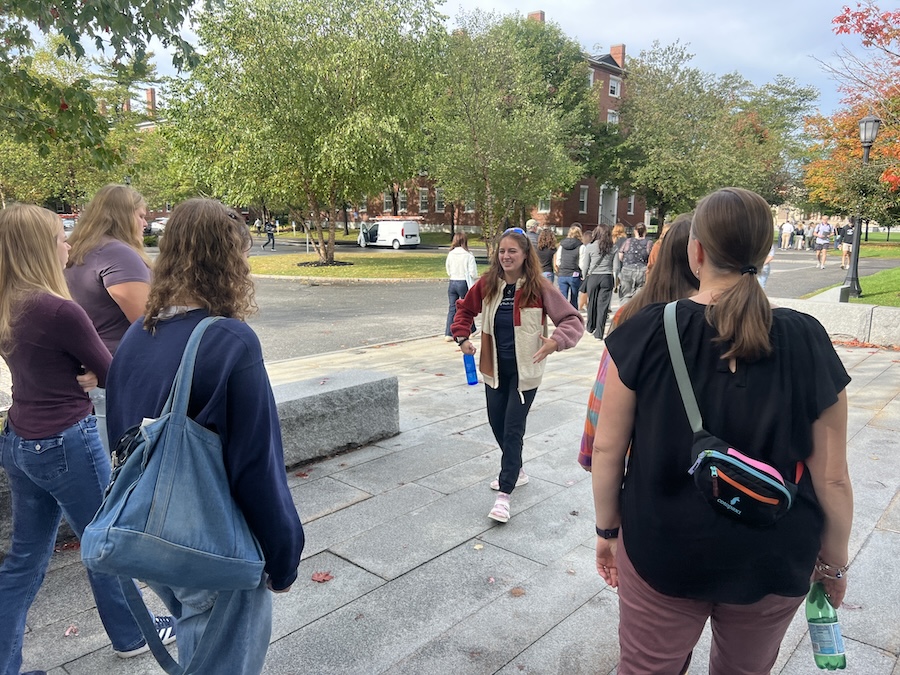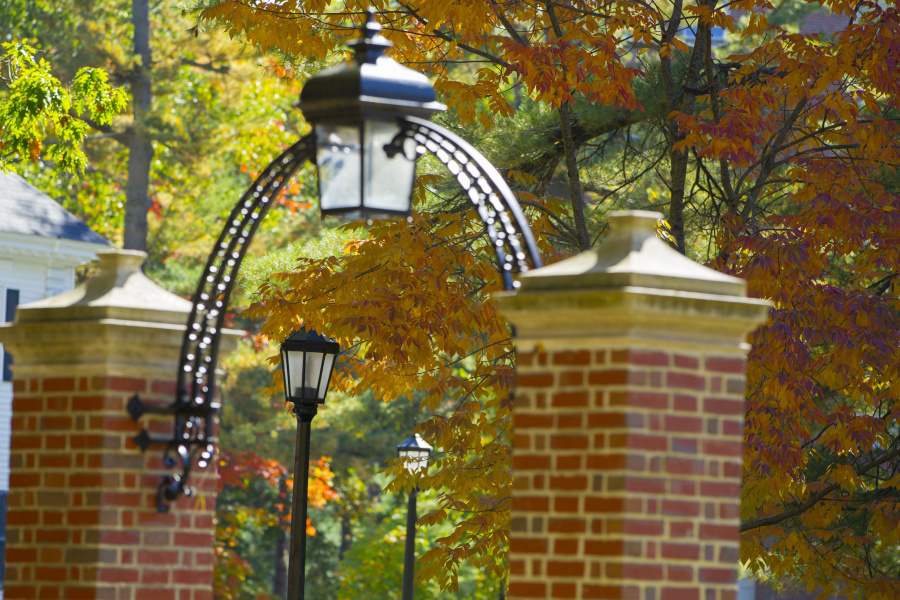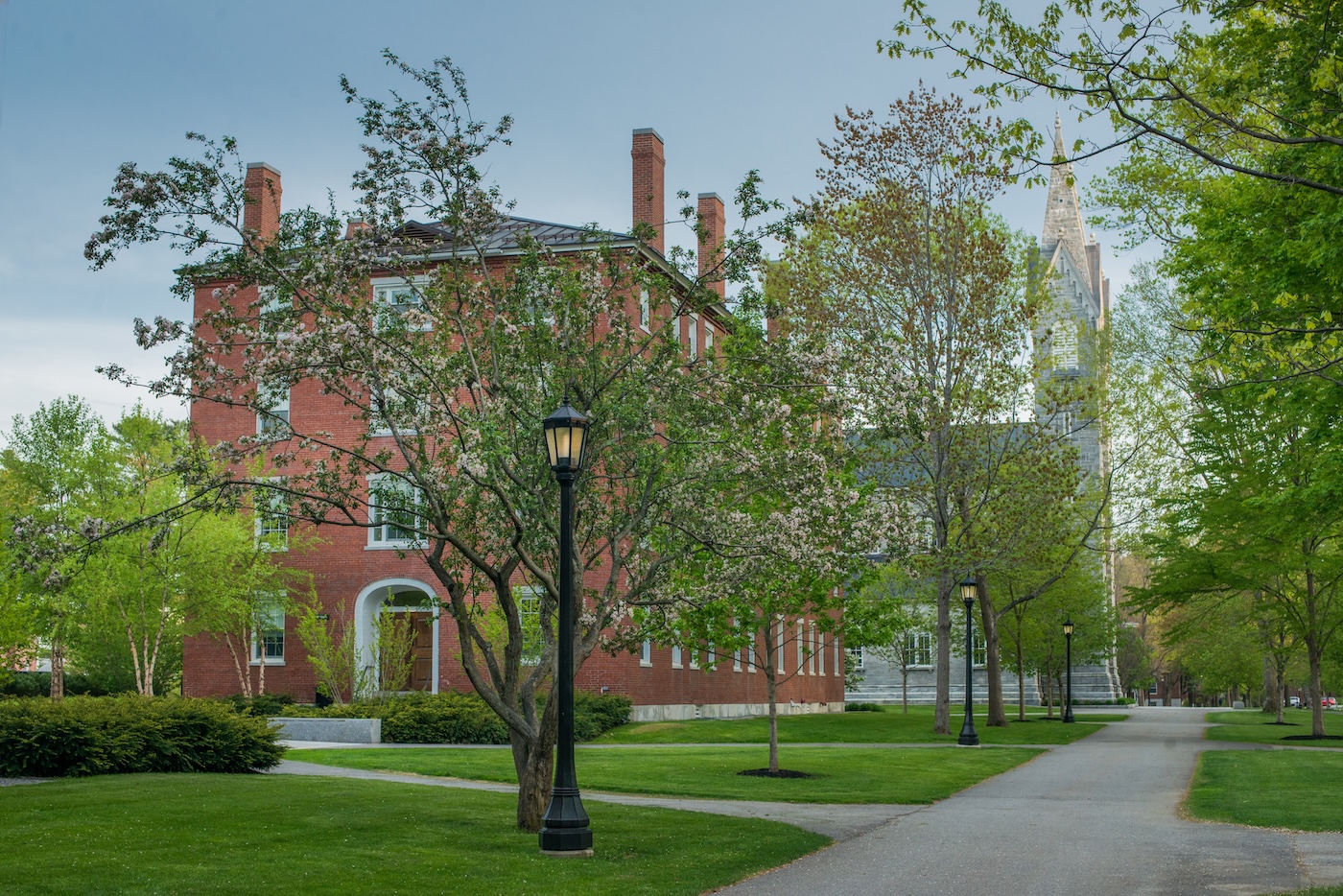Admissions in an Upended World
By Bowdoin Magazine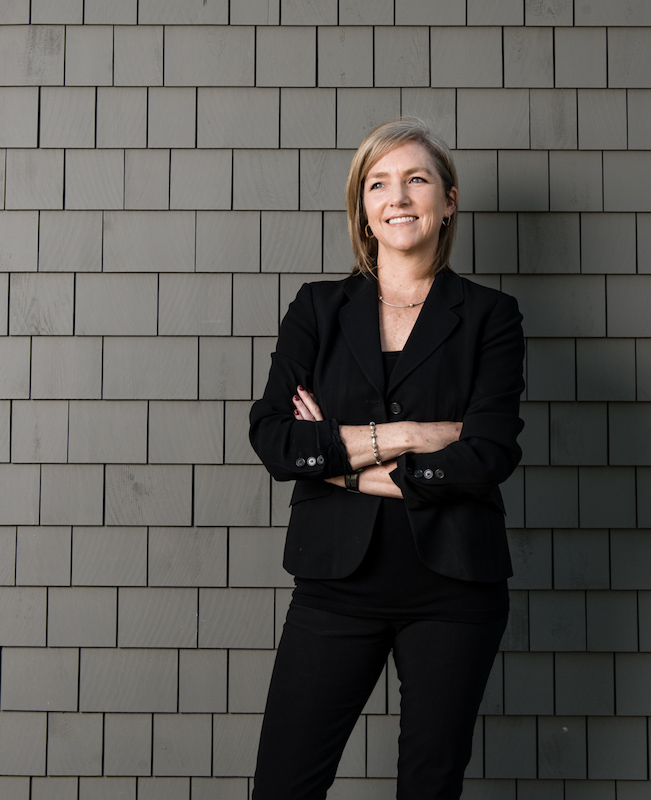
You've had to deal with a lot of challenges this admission season. If you can narrow it down, what was the biggest challenge that you and your staff faced?
The biggest challenge really has been trying to figure out how to transfer the energy of the College personality into something virtual.
We have always leaned on what it feels like to be at Bowdoin and around Bowdoin people—the warmth and the beauty of the College and our environment. We’ve been trying to figure out how to package it and show it to folks in a way that isn't too much. So that it’s not overwhelming, but it gets to the things that they need to know, and also some of the things they didn't know they were looking for.
That's probably been the biggest challenge: to figure out what it is that people need and how to get that to them in an effective way.
I’ve heard that a substantial percentage of students who are interested in Bowdoin end up applying once they've visited, once they've seen the campus and once they've interacted with our students. Is that true?
It's true that visiting campus or meeting someone from Bowdoin, whether that's an alum for an alumni interview or with one of our staff while we're traveling and visiting high schools and fairs, definitely helps draw students in and sort of inspires them to look at Bowdoin more carefully and to think about applying.
And, certainly, they're more likely to choose to come if they are admitted than students who haven't seen the College or haven’t met someone from the College.
But one of the things that's important to know is that every year we have thousands of kids applying to Bowdoin who have never visited, who won't have a chance to visit. They know they won't have a chance to visit. And, of those we admit, many of them still come.
So there is some inspiration there. Already we bring students into a class each year who have never met anybody from Bowdoin or visited—a much smaller proportion than it will be this year, but that has already been happening. But, for students who were counting on a visit to make a decision, who were planning on being able to do that after they heard from schools and can't now, that will be a different kind of gap for them in trying to figure it out than it would be for a student who wasn't planning to visit colleges at all.
Are there other aspects of this situation where you feel like Bowdoin or the Bowdoin community give you a leg up?
Well, there are a couple of things. For one, Bowdoin has always been really consistent in expressing who we are. We have a lot to lean on and draw from. The challenge is more about recasting how we express it, rather than trying to figure out what it is we have to say.
We know who we are. We know how to describe it. We just have always had the opportunity to show it in person, and now we have to show it virtually to everyone. But I have always heard that two of the things that most inspire applicants to connect are the warm and welcoming feel of Bowdoin and a campus community fueled by curiosity and challenges.
Those things are part of our ethos and are often how prospects get interested enough to apply in the first place. It goes back to the core values of the College. The common good is a huge part of what draws our applicants, even if they're not using that language directly. It’s part of their own DNA.
The biggest challenge really has been trying to figure out how to transfer the energy of the College personality into something virtual.
When we’re reading applications, we're not meeting students in person, of course. We're not having a conversation with them. We're reading about them. And yet we can tell who is Bowdoin-y. We're selecting students we can tell represent the values of the College.
I do think we have an advantage—which isn't to say other colleges can't do this—but I know for sure we have a strength in the consistency and confidence of who we are. So, the challenge is figuring out the best way to show that back to students and to their parents, because they're trying to make a decision, and it's one that’s always difficult.
But this is about as stressful and as uncomfortable as it could get. Choosing a college is a big commitment, and there are still a lot of unknown things. So we really have to rely on the things that we know are true about Bowdoin, no matter what the outside environment is. And also the things that we're pretty sure students were drawn to in the first place and just underscoring those things.
This is usually the time when students are on their victory tour, right? They've been admitted, and the ball is in the other court. They get their acceptances from Bowdoin and other places, and they've got a month or so to make a decision. It's probably a great feeling, not so much a time of anxiety. Pretty different this year.
Right. We released decisions on March 13, so when we did that, that was just at the time we knew that we were going to ask current students not to return after break. That our campus would be closed to visitors. That we'd be finishing the academic year remotely.
So we were admitting students knowing that none of them could come visit, and all of the plans we had for our on-campus celebratory programming were going to be cancelled.
Instead, we had six weeks to deliver content to students and their parents that would capture their attention. And that would remind them of the key aspects of the College and the things that we most care about and that we see suiting them really well.
And we've done that by having a really active Facebook group and Instagram for admitted students. Those aren’t new—we do them every year, but we have a lot more content going to those places right now.
Our faculty have been amazing in taking videos of themselves, describing who they are and what their departments are about, and what courses they're teaching. Bowdoin students from all over have been doing the same.
We have a video wall on the Admitted Student page. “This is who we are. This is where I’m from. This is what I do. This is what I like.” So not only is it good information, but it starts to create that personal feeling, because it is personal, and all these personalities thread together to create an aspect of Bowdoin that is not something you just read about.
And we've done livestreams, interactive and with real-time questions, pretty much weekly right up until the May 1 deadline. Some of them are student-centered. Some of them are centered on academics. We have students on every livestream along with faculty and staff, depending on what the topic is.
We've got online chats going. And admitted students can reach out to our enrolled students to ask direct questions that don't have a moderator. We have six weeks to build a relationship, and we have taken that really seriously and tried to be creative. At the same time, we’ve wanted to be careful that we're not bombarding students and parents with content without thinking about when and what it is that they might need.
The things we're already looking for in applications around empathy and awareness of others. Of intellectualism and curiosity and motivation. Those things that have already been part of our review all along would still be there.
In part of the application supplement we provide the “Offer of the College” for students, and their requirement is to choose which line of it most resonates with them. They can write about their reasons if they want to—but they all have to choose a favorite line.
So this year we mailed a box called “a bear package” that went to every admitted student, including our early decision and our QuestBridge kids, who had already deposited. And we filled it with an array of gifts, each one relating to a line from the “Offer.”
And then we inserted the “Offer of the College” into the box, indicating which line we knew the student chose as their favorite. It was just a way to say “We know who you are. This is who we are, and here are some things that you can touch and feel that are representative of Bowdoin and Maine.”
These are young people who are trying to finish up high school in these incredibly ridiculous circumstances. Are you at all concerned about the impact of this on the ability of students to finish strong?
I think this question is on the minds of every admission enrollment dean. You're right, we do review the final transcripts of every student we have admitted, just to make sure that they finish the year with the same standards that we saw when we admitted them, basically as a check against sort of traditional senioritis.
And knowing that we do that seems to be enough. I think the students we admit are likely to finish strong anyway. It’s their disposition toward learning that made them really attractive to us in the first place. But senioritis is real, and we understand it, so we usually do a pass just to make sure that everything finished up okay.
This is the year when every—not just our office but every admissions office—needs to be humane in reviewing how students finish up. There was no preparation for anybody—teachers, administrators, students, and families—to figure out how they were going to finish up this year.
And it will be uniquely different, not only for every school system, but for every student and their family. So our objective is to make sure we have a good understanding of how the student completed the year. And confidence that they stayed committed to what they were doing.
That's the bottom line, that they stayed committed. And I think we're going to need to be sensitive in the fall also, that the way students finished up high school, the way they would have completed really challenging coursework in senior year, might have been different than what they would have been able to do otherwise.
As we get them into their first term we'll need to be sensitive and be ready to support them, and that's just a reality.
Is it fair to say that the biggest impact here is on rising high school seniors? And, if so, what are the unique challenges that they are having to deal with? And how are you cutting them a break?
I think the challenges are huge, and not just for the seniors and not just for the rising seniors. Any student in high school right now, whether they are in their ninth-grade year or they are finishing up, is challenged in ways nobody ever thought they would be. The tail to this could go on for some time.
For a ninth grader, this might have an impact on how they can start tenth grade, if they feel prepared. And all of that compounds by the time they'll be a senior and us reviewing them years out from now. This experience, however long it goes on, is embedded in the high school experience for students who will be our applicants for years.
For the juniors who are now rising seniors, in particular, there are a couple of things. One, as it relates to finishing up high school: we're still going to be looking for students who are committed to applying themselves to academic challenge and curiosity. Again, being sensitive to the environment that we're all in at this point and where they'll be when they're seniors. But we’re still looking for evidence of those attributes.
Two, a thing that they may not be thinking about that's really important is that they're going to have to actively be asking for information from colleges. In a typical year, we would have had 2,000 students visit by now, primarily high school juniors starting to take tours and info sessions—and, in doing that, they register with us. They get on our mailing list. We know about them, and then they're in the pipeline to get all kinds of content.
That activity of signing up to come visit puts a student on the mailing list, and they're not coming to visit, so they're not signing up, potentially. And they don't realize that, having not done that, they're not hearing about things like what our virtual content is. Or our schedule for virtual information sessions and chats and how we're doing an online fair. They're not getting that because they're not signed up; we don't know who they are.
It’s the same thing for students who would have been taking standardized tests this spring. So many colleges, including Bowdoin, are able to source really great candidates by searching them through those big lists.
When students test and opt in and say “yes, my name is available to colleges,” we're able to do outreach to those students, many of whom don't know about us yet. Then they do, and they get on the mailing list.
So I think one of my biggest pieces of advice is about that. Students think they might be getting all they need by browsing a website, and they will get a lot by doing that. But you're not going to learn what admissions is doing specifically for you and your area, information you might need as a rising senior. This is true really for any school a student might be interested in—you should get on the website, join the mailing list. You can always get off the list if you don't like what you're getting. Students who were sort of passively finding their ways onto a mailing list before are going to need to be thinking about doing that actively now.
Do you see any kind of sea change coming out of this with regard to the attractiveness of a residential college?
That's a fair question. And it’s going to challenge all of us to explain who we are. As an institution, we integrate a lot of things into the student experience, which includes a residential experience and in-person learning. Importantly, it also includes a faculty who are at the top of their game, who are expecting to teach really ambitious students who went through a rigorous selection process and who are committed to doing really challenging work with their peers, with faculty, and with a curriculum that's been designed around inspired teaching and student engagement.
Even in a remote learning environment, the faculty from whom students learn and their peer group, even if it's a virtual one, is a pretty important part of the experience.
The traditional residential experience is central to the broader experience of Bowdoin, but it’s not the only thing that makes Bowdoin different.
Do you think that this is in fact making people truly appreciate what a place like Bowdoin does more than they would have otherwise? Is it an opportunity to really make the case for this kind of education?
I don't think it's too much of a stretch to say that people are missing contact with other people. All of us are. People are becoming really aware of how essential human interaction and friendship and relationships are, and it's not the same to be doing it virtually.
So, yes, I think that what the residential learning experience provides has a lot of appeal, when we can get back to that. And I think students who have already experienced it, our current students, are missing it. But the truth is that we don't know what the virus is going to demand of all of us in terms of social distancing, and that becomes the most important thing.
I really, really wish I could encourage students to sort of separate themselves from what they believe our expectations are and really take this time to focus on things that matter to them, whether those seem admission-related or not.
What I think is really important for students to think about, the students who are just graduating now or the ones who are coming up, is that this is changing the world we live in, in ways that aren't even measureable yet.
The idea that “I'm just going to hit the pause button, and I'll come back when this is back to normal” isn't going to happen. You can hit the pause button, but when you're ready to come back, you’ll be coming back to something different.
The idea of waiting for a switch that just flips back to normal is probably not the right focus. The focus should be, do you want to start school? Do you want to be on the pathway to a college experience that moves you closer to graduating on to the next chapter?
This is the beginning of the adventure of college. It is not the one students expected when they applied, but it's still beginning the process of working toward a degree.
And for us at Bowdoin, in an environment of inspired teachers and staff who are figuring out new ways of connecting with the Bowdoin community and connecting the students to one another? We're on it.
Do you expect that, going forward, you're going to focus on how these young people dealt with this?
I think it'll be impossible for it to not be present. Already, we're reading applications contextually. We're thinking about what the student's environment is, what their experiences have been. How they respond.
This is a monster challenge that is hitting everybody. There is not a right way to respond to something like this. But it does give us the opportunity to look for those things that really matter and always have at Bowdoin. The things we're already looking for in applications around empathy and awareness of others. Of intellectualism and curiosity and motivation. Those things that have already been part of our review all along would still be there.
But I wouldn't want students to think that we're searching for the right way that they as an individual or their families responded to this. The degree of trauma in students' lives and experiences will be so vastly different, and we are sensitive to that.
You touched on one piece of advice, which was make sure you're on the mailing list. Do you have other pieces of advice?
I think there is already so much anxiety around students trying to figure out what it is they have to do during high school to be attractive to us—and by “us” I mean admissions officers.
What are their activities? How much leadership do they need to have? Do they need to volunteer? Do they need to travel? They're looking to show their abilities relative to how they think we want to assess them.
One of the biggest challenges has always been trying to remind students that they need to do the things that are important to them because that's how we best understand them and how we'll get to what we need to know. Rather than them feeling the pressure of manufacturing a high school experience. If there were ever a time for that to resonate, it would be now, because what students may have been doing and leaning on at the beginning of their high school career—because they enjoy it, but also with an eye toward thinking ahead for how they might show strength and consistency in activities—they can’t do that now. So it may make it easier for us to make the point “you need to do what you need to do in the best way that you can.”
Maybe the activities you cared about aren't available anymore. Or you have an entirely new set of interests based on what you're experiencing and what's available to you. The most important thing is living the life in front of you, and for many people what that looks like is changing now, and it might look different next year and the year after that.
I really, really wish I could encourage students to sort of separate themselves from what they believe our expectations are and really take this time to focus on things that matter to them, whether those seem admission-related or not.
I think the number-one thing that people need right now is reassurance. Reassurance that education is worth it—and, by the way, it's also really necessary. We can't have a gap in educating people. I think students need reassurance that we have admitted them into something that might look different than what they thought, and it will be robust and full and interesting and challenging, even if it's not the thing they were expecting. Because we're still here. All the same people who were behind the thing they wanted in the first place are still the same people, with the same values and skills and interests.
There is a lot going on that's unclear, and then there are some things that are very consistent and clear.
The opportunity of an amazing education and a network of people, whether it's peers or faculty or an alumni network that's there for you when you're a student, or the one that you become part of when you graduate, that’s still strongly in place.
Do you think that the schools going to SAT optional because of these circumstances will end up staying there?
I honestly hate this question. I don't know what any other college is going to do. Whether or not test-optional stays at those schools will have a lot to do with whether they feel like they were able to make decisions without it, or if they really feel desperate and need it back.
And it's hard to speculate on that because we have not required the SAT for so long that our system is really solid without the requirement. If we had to drop a primary factor of our admission review right now because it's not available to us, that would make me nervous.
It's been a tough year for people in your line of work. You go back to a year ago with the big admission scandal. Now we have this. You might imagine that people in this line of work could be feeling a little disillusioned or not as energized as you might have been. How do you feel? It's been a year.
Honestly, this sounds like a spin answer, but it's also the truth. It's never been more important to commit to it than now. This is not a moment to relax on how important it is to do this work, to convey why it's important, to convey who we are as Bowdoin. This is as serious as it gets. This is not the time to back off and be disillusioned. This narrative—the pressure, the frustration that is all around for all kinds of reasons—is inspired for real reasons, and we need to be really serious about answering back about what's important. And making this experience better for people in the way that they apply and think about preparing for college and applying. We've had a collection of events that have just made it really critical that we be good at this.
Also, we're really tired.
And everybody thinks you're evil.
Yes, and that now it's our turn to suffer a little bit. And it's hard not to be defensive. I have to just keep reminding myself, people are angry for a reason.
They feel there is something they need that we're supposed to be providing that they don't have. We need to hear what that is and answer to it. It doesn't mean we can provide it, but the challenge is listening. Like, trying to understand what causes the anger?
When my older daughter, Eleanor, was learning to drive, she was learning on a standard transmission, because that's the car I had. And she stalled out in the middle of downtown Freeport right before Christmas, like December 23rd or something. She blocked an entire section of Main Street. She was getting more and more upset, because she was embarrassed and stressed. Every time she tried to start, she stalled out. Nobody was honking. Everybody was being great. She just wanted to get out of that intersection, and it was not working.
I said, “Eleanor, you know how to drive the car. Just take a deep breath, let the clutch out, put down the gas, and you'll go forward.” And she said, “One more try, and then I'm getting out.” I said, “There is no getting out. There is just driving. Just driving.”
And I think about that all the time, because right now we’re so tired. We expect to bear down, reading applications and selecting students, from the middle of November to the middle of March—just work all the time, put a whole bunch of things aside, and commit because we know that there is an exciting end to it.
And then we went right into this, with no end in sight. And so there is no getting out. There is just driving. So, we’re putting down the gas, and we’re going forward.
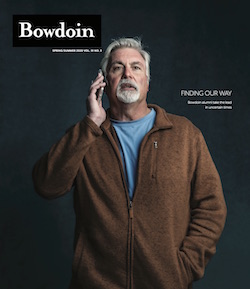
This story first appeared in the Spring/Summer 2020 issue of Bowdoin Magazine. Manage your subscription and see other stories from the magazine on the Bowdoin Magazine website.
